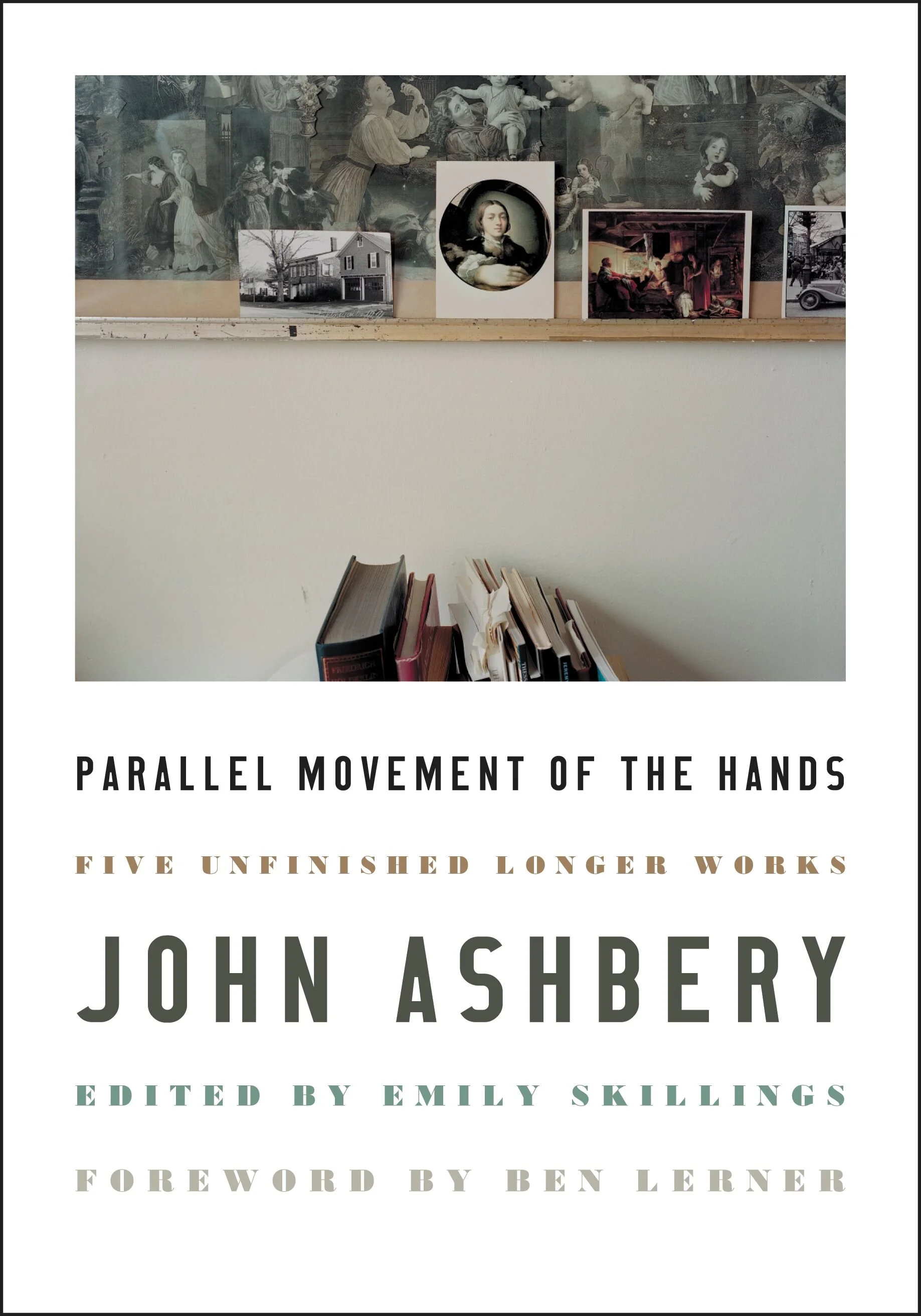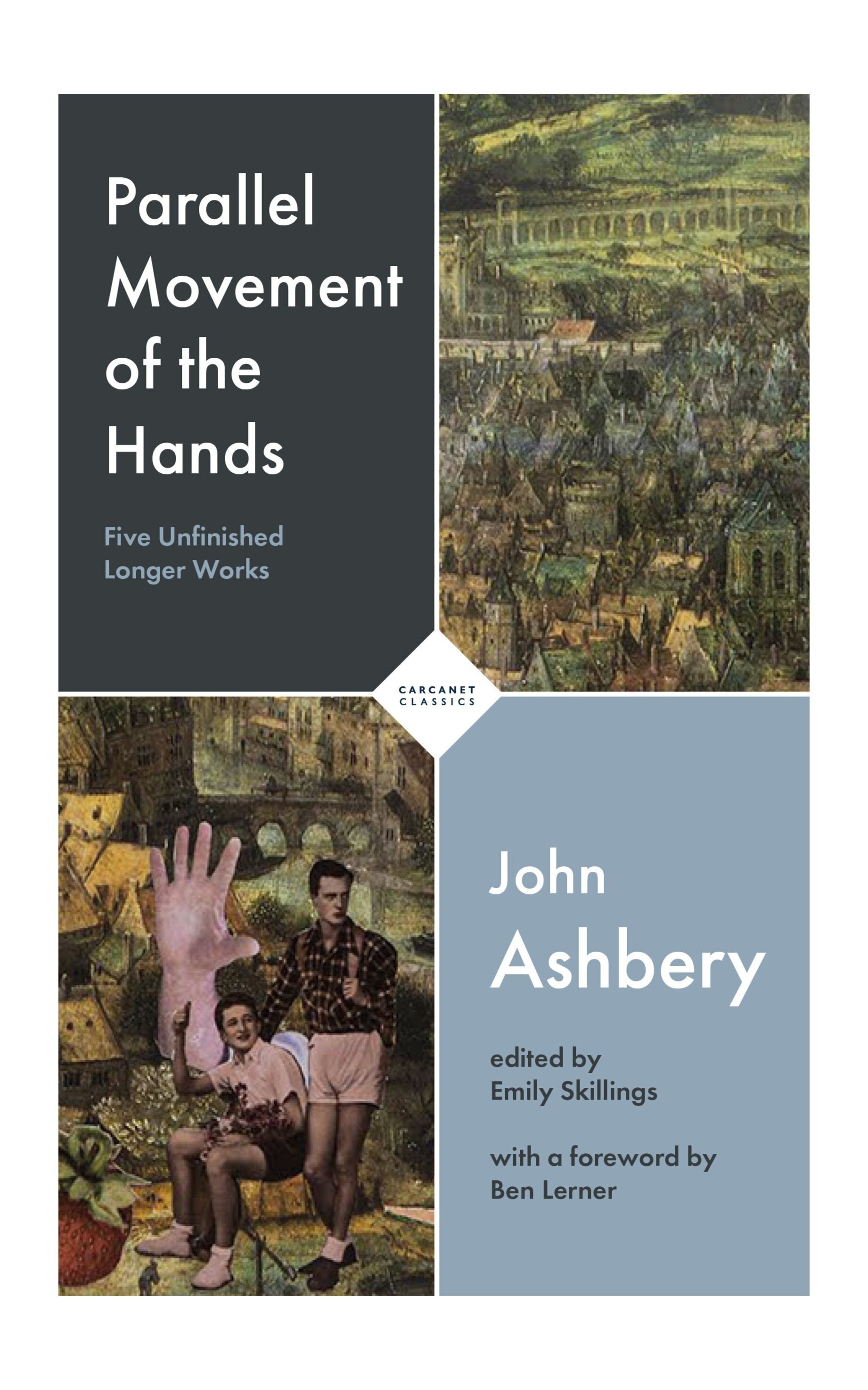Bookworm episode hosted by Michael Silverblatt
“Meet the Editor” video for Carcanet
Published Excerpts
Sacred and Profane Dances at Image Journal
“The Quitter” from The Kane Richmond Project in Issue 99 of Poetry London
from “The History of Photography” at New York Review of Books
from “The Art of Finger Dexterity” in the Paris Review
from “The Art of Finger Dexterity” in Conjunctions: 76
from “The Art of Finger Dexterity” in issue 39 of jubilat
Parallel Movement of the Hands
five unfinished longer works
by John Ashbery
Ecco, 2021
A stunning collection of work from beloved poet John Ashbery, the first volume of his poetry to be published posthumously . . .
Renowned for his inventive mind, ambitious play with language, and dexterity with a wide range of tones and styles, John Ashbery has been a major artistic figure in the cultural life of our time. Parallel Movement of the Hands gathers unpublished, book-length projects and long poems written between 1993 and 2007, along with one (as yet) undated work, to showcase Ashbery’s diverse and multifaceted artistic obsessions and sources, from children’s literature, cliffhanger cinema reels, silent films, and classical music variations by Beethoven’s pupil Carl Czerny to the history of early photography. Ashbery even provides a fresh and humorous take on a well-worn parable from the Gospel of Matthew. These works demonstrate that while producing and publishing the shorter, discrete poems often associated with his late career, Ashbery continued to practice the long-form, project-based writing that has long been an important element of his oeuvre.
This compelling and varied collection offers new insights into the process and creative interests of a poet whose work continues to influence generations of artists and poets with its signature intertextuality, openness, and simultaneity. A landmark publication of never-before-seen works, this book will enlighten scholars as well as new readers of one of America’s most prominent and celebrated poets.
Praise for Parallel Movement of the Hands
Where shall we meet up afterward?“ John Ashbery asks in one of his five astonishing so-called unfinished poems—or further revelations—posthumously collected and brilliantly edited by Emily Skillings. Well, it turns out it is here, exactly here, that we shall meet. As fortune would have it, we are not done with Ashbery any more than he is done with us. In these formally and tonally wide-ranging forays into parable and ekphrasis (photography, cinema, piano composition, private architectures—of his room and his mind), Ashbery once again amazes. Through signature digression, whimsy, melancholy edged with the continuously suspended promise of happiness, our master of deferral explores, in some of his most exhilarating work ever, what we might mean by “finish”. Because a great part of his exploration of the “unfinished “ is Ashbery’s visionary insistence on suspending the open promise of happiness, of revelation, indefinitely so that it may never be broken. As he reminds us “It’s March now, a time of no endings, of a gasp / of distances, of only further revelations.” Here in our hands now are those further revelations. What a gift to again enter his river: endless baptism, because it’s a river you can never get out of; no secure communion because consummation is always gliding away, skating further, ever more deeply alive as it disappears around the river’s bend as regret or premonition. — Jorie Graham
Reviews & Press
The Nation, Ryan Ruby
To fail to arrive at one’s intended destination is still to arrive somewhere. Ashbery never makes the mistake of inferring from the fact that we do not know what our fates are that we do not have them.
Boston Globe, “The Best Books of 2021”
John Ashbery’s first posthumous publication, peerlessly edited by his former assistant Emily Skillings, collects five serial works inspired by artistic obscurities and extrapoetic obsessions. All five are billed as “unfinished,” but they are less like unfinished symphonies than unfinished conversations, shared between lifelong friends — to be picked back up at any time, as if no time had passed at all.
— Christopher Spaide
New York Review of Books, Ange Mlinko
Skillings’s book offers a third way to read Ashbery: as a secret compendium of references, a social gathering of kindred spirits that offers itself up for literary detective work. It doesn’t much matter, of course, that these poems are “unfinished.” They metaphorically keep alive the poet who is physically no longer with us, as well as the other makers and dreamers who aroused his gigantic imagination.
Poetry Foundation, Albert Mobilio
All the poems in this volume extend a career-long mediation on making or experiencing art or even—as in the case of “The Art of Finger Dexterity”—practicing to make art.
Los Angeles Review of Books, Rowland Bagnall
Despite their varying degrees of unfinishedness, the poems in Parallel Movement of the Hands still chirp with the familiar music of Ashbery’s many-textured lyricism, rippling with the same-old “signature patterns that lend his language a “living, off-kilter quality,” as Skillings writes in her introduction, a quality which has always resisted being nailed down, though it invites a cool stream of attempts.
Publishers Weekly starred review
Fans of Ashbery will delight in this appealing and important addition to his oeuvre.
Poetry London, Dai George interviews Emily Skillings
I think a long poem really allows a poet space to take these very meaningful diversions, detours. I liked seeing [Ashbery] spread out and digress in these poems…
Carcanet blog, “Wicked Weather” by Emily Skillings


